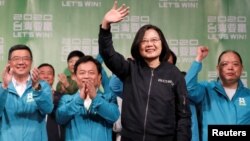China has denounced the election victory of Taiwanese President Tsai Ing-wen saying, “reunification across the Taiwan Strait is a historical inevitability.”
Tsai and her Democratic Progressive Party, or DPP, won reelection Saturday with a 57 percent majority with more than 8.1 million votes. The DPP also won 61 of 113 seats in the legislature.
China’s official Xinhua News Agency accused Tsai and the DPP of cheating and using “repression and intimidation to get votes.”
It said the result was "a development that deeply worries people who hope for peace." China had used similar language to describe Tsai’s first election victory in 2016.
Speaking in Africa, Chinese State Councillor Wang Yi said the “one China” principle will not change “because of a local election on Taiwan.” He added that it “will not be shaken because of the wrong words and actions of certain Western politicians.”
While claiming victory, Tsai said that Taiwan would not give in to threats and intimidation from China and that only Taiwan’s people had the right to decide their own future. The United States' top diplomat Mike Pompeo praised Tsai for seeking stability with China “in the face of unrelenting pressure.”
China considers Taiwan a rebel province and threatens to use force bring the island under its rule. It has periodically sent military planes and ships through the Taiwan Strait separating the sides as a show of force.
Tsai has rejected China’s condition for negotiations which states that Taiwan must accept that both sides belong under one flag. The two sides have been separated since 1949 when the Communists took control of mainland China at the end of the country’s civil war.
Tsai told reporters after the election that, “Pressure from China will continue to exist and could even become heavier.”
Will relations change
Some experts, however, believe that China will have calm relations with Taiwan because Tsai no longer needs to show her strong opposition to the mainland. Tsai’s presidential campaign brought attention to mainland China’s efforts against protestors in Hong Kong. Mainland China would seek to rule Taiwan the same way, Tsai said.
“I don’t think China will ever back off,” said Yun Sun, who is with the East Asia Program at the Stimson Center, a research group in Washington D.C. She said Chinese officials hope to start talks at some time. She added that, “it is in the mainland’s interest not to overplay it.”
Wang Ching-Hsing is an assistant political science professor at National Cheng Kung University. He said China’s reaction so far is verbal, or is only in words. But he said it is unlikely that Tsai will hold any talks with Chinese officials during her second term.
Wang noted that Chinese President Xi Jinping would insist on his goal of ruling Taiwan. Last year, Xi gave a speech calling for China to rule Taiwan under the “one country, two systems” model. That term describes China’s policy toward Hong Kong since 1997 which was supposed to permit Hong Kong to keep its local laws and government systems. But huge protests against Chinese rule in Hong Kong through much of 2019 have tested that model.
Public opinion studies have shown that a majority of Taiwanese reject that idea. Tsai suggested that the two sides may establish communications if China respects the will of the Taiwanese people.
I’m Mario Ritter, Jr.
Mario Ritter, Jr. adapted this for VOA Learning English based on VOA and Reuters news reports. Hai Do was the editor.
________________________________________________________________
Words in This Story
inevitability –n. something that is sure to happen
repression –n. using force to control someone or something
intimidation –n. to make someone afraid
unrelenting –adj. not slowing down or stopping
overplay –v. to give too much attention to something
parity –n. a state of being equal








